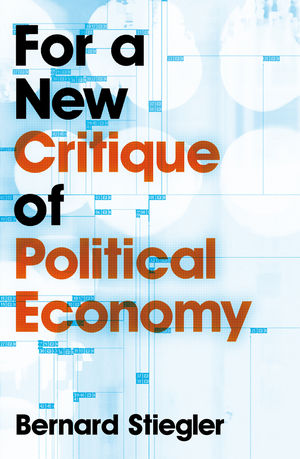Aradhana Sharma, Akhil Gupta (eds.): The Anthropology of the State: A Reader (2005)
Filed under book | Tags: · anthropology, bureaucracy, democracy, economy, feminism, governmentality, ideology, immigration, labour, neoliberalism, politics, power, production, society, state

This innovative reader brings together classic theoretical texts and cutting-edge ethnographic analyses of specific state institutions, practices, and processes and outlines an anthropological framework for rethinking future study of “the state”.
– Focuses on the institutions, spaces, ideas, practices, and representations that constitute the “state”.
– Promotes cultural and transnational approaches to the subject.
– Helps readers to make anthropological sense of the state as a cultural artifact, in the context of a neoliberalizing, transnational world.
Publisher Blackwell Publishing, 2006
ISBN 1405114681, 9781405114684
424 pages
Bernard Stiegler: For a New Critique of Political Economy (2010)
Filed under book | Tags: · consumption, critique, economy, labour, marxism, philosophy, political economy, politics, society, technics

“The catastrophic economic, social and political crisis of our time calls for a new and original critique of political economy – a rethinking of Marx’s project in the very different conditions of twenty-first century capitalism.
Stiegler argues that today the proletarian must be reconceptualized as the economic agent whose knowledge and memory are confiscated by machines. This new sense of the term ‘proletarian’ is best understood by reference to Plato’s critique of exteriorized memory. By bringing together Plato and Marx, Stiegler can show how a generalized proletarianization now encompasses not only the muscular system, as Marx saw it, but also the nervous system of the so-called creative workers in the information industries. The proletarians of the former are deprived of their practical know-how, whereas the latter are shorn of their theoretical practice, and both suffer from a confiscation of the very possibility of a genuine art of living.
But the mechanisms at work in this new and accentuated form of proletarianization are the very mechanisms that may spur a reversal of the process. Such a reversal would imply a crucial distinction between one’s life work, originating in otium (leisure devoted to the techniques of the self), and the job, consisting in a negotium (the negotiation and calculation, increasingly restricted to short-term expectations), leading to the necessity of a new conception of economic value.
This short text offers an excellent introduction to Stiegler’s work while at the same time representing a political call to arms in the face of a deepening economic and social crisis.”
Publisher Polity, 2010
ISBN 0745648045, 9780745648040
100 pages
PDF (updated on 2020-8-7)
Comment (0)Transit Labor: Circuits, Regions, Borders 1-2 (2010)
Filed under brochure | Tags: · australia, capitalism, china, city, economy, india, labour, mobility, urbanism

Transit Labor: Circuits, Regions, Borders #2
When jurisdiction can no longer be aligned with territory and governance does not necessarily assume liberalism, there is a need to rethink the relations between labour, mobility and space. Bringing together researchers from different parts of the world to discuss and pursue various paths of investigation and collaboration, the Shanghai Transit Labour Research Platform moved between online and offline worlds. Sometimes sequestered in seminar spaces and at other times negotiating the city and the regulatory environment, the participants drifted toward a collective enunciation. We could say this was about the production of new kinds of labouring subjectivities that build connections between domains which are at once becoming more irreconcilable and more indistinct: life and work, public and private, political and economic, natural and cultural.
Editors: Kernow Craig, Brett Neilson, Ned Rossiter, Soenke Zehle
December 2010
48 pages
Creative Commons License

Transit Labor: Circuits, Regions, Borders #1
Transit-labour investigates changing patterns of labour and mobility in the whirlwind of Asian capitalist transformation. Mindful of the view of Asia as the world’s factory, this three year research project examines the role of creativity, invention and knowledge production in the new economic order being forged from the region’s capitalist centres. Particular attention is given to changing relations of culture and economy in this transition and their entanglement with the production of new subjectivities and modalities of labour.
Editors: Kernow Craig, Brett Neilson, Ned Rossiter
July 2010
20 pages
Creative Commons License
Direct download, Volume 2
Direct download, Volume 1

